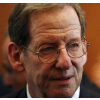Azerbaijan
 Suleymanov, Elin
Suleymanov, Elin
The former Soviet republic of Azerbaijan, located in the Caucasus Mountains west of the Caspian Sea, south of Russia and north of Iran, has sent a new ambassador to the U.S. Elin Suleymanov is quite familiar with the U.S., having lived here ten years of his life, including the past six years in Los Angeles.
- Table of Contents
- News
- Overview
- Basic Information
- History
- Newspapers
- History of U.S. Relations with Azerbaijan
- Current U.S. Relations with Azerbaijan
- Where Does the Money Flow
- Controversies
- Human Rights
- Debate
- Past Ambassadors
- Ambassador to the U.S.
- Embassy Web Site in the U.S.
- Comments
- Leave a comment
U.S. Ambassador to Azerbaijan

On September 17, 2014, the Senate Foreign Relations Committee held a hearing into the nomination of Robert F. Cekuta, a career Foreign Service officer, to be the next U.S. ambassador to Azerbaijan. If confirmed, it will be the first ambassadorial post for Cekuta.
Cekuta, who’s from New York, attended Georgetown University’s School of Foreign Service, graduating in 1976 with a B.S. He then went to the Thunderbird School of Global Management, earning a Master’s in International Marketing in 1978. He later earned another Master’s degree, in national security strategies, from the National War College.
He joined the Foreign Service in 1978 and his early postings included Vienna, Austria; Baghdad, Iraq; Johannesburg, South Africa; and Sana’a, Yemen. He also directed a task force in Kosovo during the conflict there and served in the Bureau of Near East and South Asian Affairs. From 1996 to 1999, he was deputy chief of mission in the U.S. Embassy in Tirana, Albania.
Much of Cekuta’s career has focused on business and trade issues. In 1999, he was senior advisor to the Office of the U.S. Trade Representative and in 2000 he was named director of Economic Policy Analysis and Public Diplomacy in the State Department. Cekuta in 2002 was named director of the Iraq Economic Group in the Bureau of Economic and Business Affairs. In 2002, he was also a special negotiator for biotechnology in the Bureau of Economic and Business Affairs. Beginning in 2003, Cekuta was economic minister-counselor at the embassy in Berlin and in 2007 he was sent to Tokyo as the minister-counselor for economic affairs.
Cekuta came home in 2010, first as senior advisor for Food Security in the State Department and later that year as deputy assistant secretary of state for Energy, Sanctions and Commodities. One of his more prominent roles involved working with the jewelry industry on compliance with regulations on conflict diamonds and gold.
Since 2011, Cekuta has been deputy assistant secretary of state in the Energy Resources Bureau. As such, he has acted as a point man for the State Department’s views on the proposed Keystone XL pipeline, which would bring tar sands oil from Canada into the United States. That experience will come in handy in Azerbaijan, a major oil producer.
Cekuta and his wife, Anne, have three children. He speaks German, Arabic and Albanian.
-Steve Straehley
To Learn More:
Senate Confirmation Testimony (pdf)
State Department Cables 1992-2009 (WikiLeaks)
A Discussion with Robert Cekuta, Deputy Assistant Secretary of State for Energy, Sanctions and Commodities (Georgetown University)
morePrevious U.S. Ambassador to Azerbaijan

Energy-rich Azerbaijan, strategically located south of Russia and north of Iran, has become accustomed to being wooed by both Russia and the United States, especially when it comes to energy development. With relations hampered by the lack of a full-time U.S. ambassador in Baku since December, President Barack Obama on April 26 announced his intent to nominate Richard L. Morningstar, who has specialized in Caspian basin energy issues for about 15 years, to be the next ambassador. Obama’s first nominee to the post of ambassador to Azerbaijan, Matthew Bryza, was never confirmed by the Senate because of opposition from Armenian-Americans and he served only as a recess appointment.
Born in Newton, Massachusetts, in 1945, Morningstar earned a BA at Harvard in 1967 and a JD from Stanford Law School in 1970. He began his career in 1970 as an attorney with Nixon and Peabody in Boston, where he became a partner in 1977. He left the firm in 1981 to become President and CEO of Costar Corporation, adding the title of chairman of the Board from 1990 to 1993. Morningstar also served as a commissioner of the National Conference of Commissioners on Uniform State Laws from 1989 to 1993.
Leaving the private sector after the election of President Bill Clinton, Morningstar served as senior vice president of the Overseas Private Investment Corporation from 1993 to 1995. From 1995 to 1998, he served as special advisor to the president and secretary of state on Assistance to the New Independent States of the Former Soviet Union. From 1998 to 1999, he was special advisor to the President and the secretary of state for Caspian Basin Energy Diplomacy.
From 1999 to September 2001, Morningstar served as U.S. ambassador to the European Union. During his service from 1995 to 2001, his major achievement was to push through the construction of the Baku-Tbilisi-Ceyhan (BTC) oil pipeline, which became operational in July 2006. The stated commercial purpose of this 1,100-mile-long pipeline is to carry Caspian Sea (Azerbaijani) oil to world markets via a sea terminal on Turkey’s Mediterranean Coast. Geopolitically, the purpose of the pipeline was to cut Russia and Iran out of the loop on Caspian Sea oil.
Back in the private sector after the election of George W. Bush in 2000, Morningstar was a senior director for Stonebridge International LLC starting in October 2001, and taught courses at Stanford Law School from 2004 to 2009 and at Harvard University’s Kennedy School of Government from 2003 to 2009. In April 2009, he returned to government as the secretary of state’s special envoy for Eurasian Energy. He is currently a member of the Council on Foreign Relations.
A longtime Democrat, since 1990 Morningstar has contributed more than $320,000 to Democratic candidates and causes, including $172,000 to the Democratic National Committee, $12,900 to Secretary of State Hillary Clinton’s campaigns, and $4,600 to President Obama’s 2008 presidential campaign. Morningstar is married to Faith Pierce Morningstar; they have two sons and two daughters.
-Matt Bewig
Richard Morningstar: Letter to a Wayward Classmate (by Gilbert Doctorow)
The Baku-Tbilisi-Ceyhan Pipeline: A Retrospective and a Look at the Future (by Richard Morningstar, Central Asia-Caucasus Institute Analyst)
The Great Game: An Opportunity for Transatlantic Cooperation (by Richard Morningstar, Bertelsmann Stiftung) (pdf)
more
 Suleymanov, Elin
Suleymanov, Elin
The former Soviet republic of Azerbaijan, located in the Caucasus Mountains west of the Caspian Sea, south of Russia and north of Iran, has sent a new ambassador to the U.S. Elin Suleymanov is quite familiar with the U.S., having lived here ten years of his life, including the past six years in Los Angeles.
Comments
U.S. Ambassador to Azerbaijan

On September 17, 2014, the Senate Foreign Relations Committee held a hearing into the nomination of Robert F. Cekuta, a career Foreign Service officer, to be the next U.S. ambassador to Azerbaijan. If confirmed, it will be the first ambassadorial post for Cekuta.
Cekuta, who’s from New York, attended Georgetown University’s School of Foreign Service, graduating in 1976 with a B.S. He then went to the Thunderbird School of Global Management, earning a Master’s in International Marketing in 1978. He later earned another Master’s degree, in national security strategies, from the National War College.
He joined the Foreign Service in 1978 and his early postings included Vienna, Austria; Baghdad, Iraq; Johannesburg, South Africa; and Sana’a, Yemen. He also directed a task force in Kosovo during the conflict there and served in the Bureau of Near East and South Asian Affairs. From 1996 to 1999, he was deputy chief of mission in the U.S. Embassy in Tirana, Albania.
Much of Cekuta’s career has focused on business and trade issues. In 1999, he was senior advisor to the Office of the U.S. Trade Representative and in 2000 he was named director of Economic Policy Analysis and Public Diplomacy in the State Department. Cekuta in 2002 was named director of the Iraq Economic Group in the Bureau of Economic and Business Affairs. In 2002, he was also a special negotiator for biotechnology in the Bureau of Economic and Business Affairs. Beginning in 2003, Cekuta was economic minister-counselor at the embassy in Berlin and in 2007 he was sent to Tokyo as the minister-counselor for economic affairs.
Cekuta came home in 2010, first as senior advisor for Food Security in the State Department and later that year as deputy assistant secretary of state for Energy, Sanctions and Commodities. One of his more prominent roles involved working with the jewelry industry on compliance with regulations on conflict diamonds and gold.
Since 2011, Cekuta has been deputy assistant secretary of state in the Energy Resources Bureau. As such, he has acted as a point man for the State Department’s views on the proposed Keystone XL pipeline, which would bring tar sands oil from Canada into the United States. That experience will come in handy in Azerbaijan, a major oil producer.
Cekuta and his wife, Anne, have three children. He speaks German, Arabic and Albanian.
-Steve Straehley
To Learn More:
Senate Confirmation Testimony (pdf)
State Department Cables 1992-2009 (WikiLeaks)
A Discussion with Robert Cekuta, Deputy Assistant Secretary of State for Energy, Sanctions and Commodities (Georgetown University)
morePrevious U.S. Ambassador to Azerbaijan

Energy-rich Azerbaijan, strategically located south of Russia and north of Iran, has become accustomed to being wooed by both Russia and the United States, especially when it comes to energy development. With relations hampered by the lack of a full-time U.S. ambassador in Baku since December, President Barack Obama on April 26 announced his intent to nominate Richard L. Morningstar, who has specialized in Caspian basin energy issues for about 15 years, to be the next ambassador. Obama’s first nominee to the post of ambassador to Azerbaijan, Matthew Bryza, was never confirmed by the Senate because of opposition from Armenian-Americans and he served only as a recess appointment.
Born in Newton, Massachusetts, in 1945, Morningstar earned a BA at Harvard in 1967 and a JD from Stanford Law School in 1970. He began his career in 1970 as an attorney with Nixon and Peabody in Boston, where he became a partner in 1977. He left the firm in 1981 to become President and CEO of Costar Corporation, adding the title of chairman of the Board from 1990 to 1993. Morningstar also served as a commissioner of the National Conference of Commissioners on Uniform State Laws from 1989 to 1993.
Leaving the private sector after the election of President Bill Clinton, Morningstar served as senior vice president of the Overseas Private Investment Corporation from 1993 to 1995. From 1995 to 1998, he served as special advisor to the president and secretary of state on Assistance to the New Independent States of the Former Soviet Union. From 1998 to 1999, he was special advisor to the President and the secretary of state for Caspian Basin Energy Diplomacy.
From 1999 to September 2001, Morningstar served as U.S. ambassador to the European Union. During his service from 1995 to 2001, his major achievement was to push through the construction of the Baku-Tbilisi-Ceyhan (BTC) oil pipeline, which became operational in July 2006. The stated commercial purpose of this 1,100-mile-long pipeline is to carry Caspian Sea (Azerbaijani) oil to world markets via a sea terminal on Turkey’s Mediterranean Coast. Geopolitically, the purpose of the pipeline was to cut Russia and Iran out of the loop on Caspian Sea oil.
Back in the private sector after the election of George W. Bush in 2000, Morningstar was a senior director for Stonebridge International LLC starting in October 2001, and taught courses at Stanford Law School from 2004 to 2009 and at Harvard University’s Kennedy School of Government from 2003 to 2009. In April 2009, he returned to government as the secretary of state’s special envoy for Eurasian Energy. He is currently a member of the Council on Foreign Relations.
A longtime Democrat, since 1990 Morningstar has contributed more than $320,000 to Democratic candidates and causes, including $172,000 to the Democratic National Committee, $12,900 to Secretary of State Hillary Clinton’s campaigns, and $4,600 to President Obama’s 2008 presidential campaign. Morningstar is married to Faith Pierce Morningstar; they have two sons and two daughters.
-Matt Bewig
Richard Morningstar: Letter to a Wayward Classmate (by Gilbert Doctorow)
The Baku-Tbilisi-Ceyhan Pipeline: A Retrospective and a Look at the Future (by Richard Morningstar, Central Asia-Caucasus Institute Analyst)
The Great Game: An Opportunity for Transatlantic Cooperation (by Richard Morningstar, Bertelsmann Stiftung) (pdf)
more






Comments